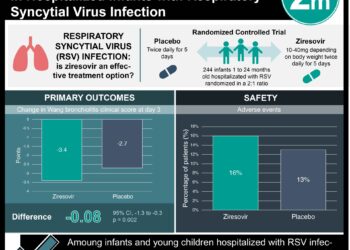Evidence-based supportive therapy for bronchiolitis varies significantly between hospitals
1. Less than 75% of study infants hospitalized with acute bronchiolitis received the current recommended treatment, evidence-based supportive therapies (EBST), with significant variation between site of hospitalization.
2. Infants with apnea and dehydration more likely to received EBST, while those with chest retractions and dehydration were more likely to receive nonrecommended pharmacotherapies and chest radiographies, respectively.
Evidence Level: 2 (Good)
Study Rundown: Current guidelines support the use of EBST (defined as intravenous [IV] or nasogastric [NG] hydration, oxygen, and airway support) for the management of bronchiolitis, the most common reason for infant hospitalization. Studies from inpatient populations show an increase in hospitalization rates of children with more mild disease, and many children continue to receive pharmacotherapy and chest radiographies even though these measures are not routinely recommended. Researchers in this study analyzed data from 6 pediatric emergency research networks in 8 countries to determine the intersite and internetwork variation in infants hospitalized with a diagnosis of bronchiolitis who received at least 1 EBST during their ED visit or within 6 hours of their inpatient stay. They also looked at variation in use of chest radiographies (CXR) and nonrecommended pharmacotherapies. Results indicated that about 70% of hospitalized patients studied received ≥ 1 EBST, and that rates varied significantly by site but not network. Overall, apnea and dehydration were the highest predictors of EBST use. CXR and pharmacotherapy use varied by site and by network, with highest rates of pharmacotherapy use in Spain/Portugal, and highest rates of CXR in the United States and Canada. This study reviewed data from tertiary care pediatric EDs which may limit its generalizability. Results from this study suggest the need for increased education and quality improvement strategies to encourage providers to follow recommended best practices and reduce unnecessary resource use when managing acute bronchiolitis in infants.
Click to read the study, published today in Pediatrics
Relevant reading: Variation in the management of infants hospitalized for bronchiolitis persists after the 2006 American Academy of Pediatrics bronchiolitis guidelines
In-depth [retrospective cohort]: This study enrolled previously healthy children <12 months old diagnosed with a first episode of bronchiolitis at 38 EDs in 8 countries during 2013. A total of 3725 patients (mean age 4.5 months, 61.1% male, 39.4% hospitalized) were included in this study which looked at rates of hospitalization with EBST, hospitalization without EBST, or discharge directly from the ED. Use of EBST was defined as hospitalization plus 1) IV or NG fluids, 2) supplemental oxygen, or 3) airway support administered during ED stay or within 6 hours of admission. Results indicated that 69.8% of hospitalized infants received ≥ 1 EBST, with rates ranging per site from 6.1% to 99.0% (median 23.4%; 95%CI 17.9%-28.3%, p < .001). Highest rates were seen among infants with apnea (OR 3.40, 95%CI 2.40-4.91) and dehydration (OR 3.22, 95%CI 2.31-4.35). No significant association was found between EBST use and network, however use of pharmacotherapy and CXR varied significantly by site (p < .001 for both) and network (p < .001 for pharmacotherapy and p = .002 for CXR). Pharmacotherapy use ranged from 2% to 79% between sites (median 24.5%; 95%CI 12.1%–40.3%) with higher odds found in Spain/Portugal, and among children with chest retractions (OR 22.7, 95%CI: 4.5–111.0 and OR 2.2, 95%CI 1.7–3.0, respectively). CXR performance ranged from 1.6% to 80.8% between sites (median 22.4%, 95%CI 13.0%–25.2%) with higher odds found in the US and Canada (OR 4.9, 95%CI 2.0–12.2 and OR 4.9, 95%CI 1.9–12.6, respectively) and among children with dehydration (OR 2.1, 95% CI1.5–2.9).
Image: PD
©2017 2 Minute Medicine, Inc. All rights reserved. No works may be reproduced without expressed written consent from 2 Minute Medicine, Inc. Inquire about licensing here. No article should be construed as medical advice and is not intended as such by the authors or by 2 Minute Medicine, Inc.

![RSV positivity associated with reduced serious bacterial infection risk [Classics Series]](https://www.2minutemedicine.com/wp-content/uploads/2013/09/800px-Respiratory_syncytial_virus_01-350x250.jpg)





